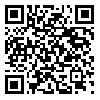Volume 13, Issue 8 (11-2013)
Iranian Journal of Medical Education 2013, 13(8): 681-691 |
Back to browse issues page
Download citation:
BibTeX | RIS | EndNote | Medlars | ProCite | Reference Manager | RefWorks
Send citation to:



BibTeX | RIS | EndNote | Medlars | ProCite | Reference Manager | RefWorks
Send citation to:
Borjalilu S, Borjalilu N, Mohammadi A, Mojtahedzadeh R. Identification and Prioritization of Factors Affecting E-teacher’s Performance based on Fuzzy Analytic Hierarchy Process (AHP). Iranian Journal of Medical Education 2013; 13 (8) :681-691
URL: http://ijme.mui.ac.ir/article-1-2641-en.html
URL: http://ijme.mui.ac.ir/article-1-2641-en.html
, r_mojtahedzadeh@tums.ac.ir
Abstract: (14870 Views)
Introduction: Information and communication technology has changed the traditional role of teachers and learners. It’s important to detect factors influencing e-teachers’ role to improve their performance more than ever. So in this study we identified and prioritized factors influencing e-teacher’s effective performance.
Methods: In this descriptive study, 15 e-learning experts from Tehran University of Medical Sciences were selected through purposeful sampling. Having focus group sessions held, their viewpoints about main factors affecting e-teacher’s performance were collected. In order to collect the views toward the significance of each criterion, a questionnaire was developed regarding the main criterion and its subordinates in which there was a comparison table for each criterion. Then Fuzzy Analytic Hierarchy Process decision making was used for prioritizing and weighting factors (ie., criteria).
Results: Totally 5 factors influencing e-teachers’ performance were extracted. The factor of professional knowledge had the highest weight (0.28) was recognized as the most important factor. This factor did not have any subordinate. Technology with the lowest weight (0.137) was identified as the least important factors affecting e-teacher’s performance. Factors (and their most important subordinates with the highest coefficients) were as follows: skillfulness in e-teacher role playing (mastery in pedagogy), technology (mastery in information technology), management (management of virtual classroom), and personality factor (interest in virtual training).
Conclusion: In order to select an e-teacher and develop his capabilities, it must be considered that IT expertise is of the least importance and teachers who encompass factors such as professional knowledge and are able to act as an effective teacher, are also able to act as a successful e-teacher.
Type of Study: Original research article |
Subject:
E-learning
Received: 2013/04/17 | Accepted: 2013/09/12 | Published: 2013/11/3 | ePublished: 2013/11/3
Received: 2013/04/17 | Accepted: 2013/09/12 | Published: 2013/11/3 | ePublished: 2013/11/3
پرسشنامه مطالعه [DOCX 33 KB] (554 Download)
Send email to the article author
| Rights and permissions | |
 |
This work is licensed under a Creative Commons Attribution-NonCommercial 4.0 International License. |




